Peter MALONE
Saturday, 18 September 2021 19:52
Son of a Gun
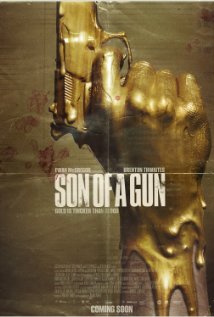
SON OF A GUN
Australia, 2014, 108 minutes, Colour.
Ewan Mc Gregor, Brenton Thwaites, Alicia Vikander, Matt Nable, Damon Herriman, Nash Edgerton, Jacek Koman, Tom Budge.
Directed by Julius Avery.
Son of a Gun is a swaggering kind of title, with the touch of the macho. It is a story of criminals in Western Australia, in prison, out of prison, and carrying off a huge robbery at the Kalgoorlie Gold mines.
The international star is Ewan Mc Gregor, using his Scots accent, playing Brendan, a famous robber, who finds himself in jail, looking for an opportunity to escape, looking for a young patsy that he can rely on to make connections when he gets out of jail after a short-term sentence.
The young man is played by Brenton Thwaites, a young actor from Cairns and a stint in Home and Away. 2014 was a particularly good year for him, playing Prince Charming in Maleficent and the futuristic hero of The Giver. His role in Son of a Gun is a strong one and he keeps audience attention on himself, even when working with Ewan Mc Gregor.
The film establishes the two characters in the first part of the film, with the young JR (Thwaites) entering into prison in the usual style, assigned to a cell where his cellmate is the sexual victim of some bruisers in the prison, JR trying to help him but warned by Brendan (McGregor) to be very careful. A bond is established between the two, with JR giving Brendan advice about chess moves and Brendan saving him from the bruisers. Prison life is a mixture of routine and moments of brutality.
The film opens up when JR is released, goes to make contact with the criminal recommended by Brendan, finds himself in somewhat luxurious surroundings, attracted by a young woman from eastern Europe who is controlled by the master criminal. He Is able to arrange an escape after an amusing, but serious, encounter with an arms dealer (Damon Harriman) and a lesson on guns and their power, using a helicopter – and this looks so easy, despite some shooting by prison guards, that audiences might think this is quite credible and possible. It is not only possible here but actual, so Brendan and his close associates are out and it is time to plan that gold robbery in Kalgoorlie.
There are romantic moments for JR and Tasha (Alicia Vikander from the Danish film, A Royal Scandal), some clashes with some young would-be tasks toughs and supportive tuition from Brendan.
The latter part of the film shows the robbery in detail, the escape, and, as we might have suspected, no honour among thieves.
By the end of the film, JR has certainly learnt a lot from Brendan and shrewd enough to get an upper hand.
The film makes Western Australia look attractive as well as desolate in the mines around Kalgoorlie. And, as heist and caper films go, with its Australian touches, this is quite an – even improbable – entertainment.
1. An Australian story? Locations, crime, characters?
2. The West Australian locations, the prison, the city, the coast, the docks, Kalgoorlie, the mines and desert, Melbourne? Australian atmosphere? Musical score?
3. The title, the term, reference to JR, to Brendan? Father-son relationships?
4. The prison story: JR, entering, the process, searching, photos, fingerprints? The cell, the cellmate and his tension? The common area, the gathering of the prisoners, playing cards, chess? In the yard? JR at 19, petty criminal, open, naive? His concern for his cellmate, the rape of the brutal gang, his causing the upset so that the guards would come and save the cellmate, the cellmate’s suicide and its effect on JR? His being targeted, Brendan and his group helping him? Interest in Brendan, his reputation, the chess game, his clever moves? Indebted to Brendan? To his group? The fights? The man falling to his death? Brendan and his notes, giving them to JR, JR and the exit, freedom?
5. JR contacting Sam, Russian, criminal, his lavish home, the new flat for JR, the touch of luxury? The visit from Tasha? His freedom, looking out on the beach? The phone calls, the orders? With Sam’s group, Josh and his criticisms of JR?
6. JR going to the former soldier, the stash of guns, testing them out, buying them, the target practice? the character of the arms dealer and his experience? Hiring the helicopter, pulling the gun, the landing in the prison, the shootout and the escape? Landing, the cars, the radio information about the prisoner who was an abuser, Brendan bashing and leaving him?
7. Going to the apartment, Brendan arranging for a new house at ground level? Brendan and Sam, the chess games and moves? Thieves – and honour or not?
8. The planning of the crime, Sam wanting Josh to be more prominent, Brendan wanting JR? The fight between the two young men? Sam and his orders? The maps, the detail?
9. JR, his age, experience, loyalties, criminal world, memories of his own father, needing a father-figure? The interactions with Tasha, her place with Sam, for show? The bar, going out, the Chinese meals, the chopsticks? Tasha and her hesitation? Wary about sex? The night together, the lies to Sam?
10. Carrying out the crime, Kalgoorlie, the vistas, the plant, JR in the roof, the others coming in with the vehicles, JR dropping the torch, opening the door, the staff and their fear, producing the gold bars, the group taking them? Josh, shooting the man in the leg? Alerting authorities? Brendan and his reaction? The difficulties, getting out, the long police pursuit? Sterlo and his loyalty to the group, his wife and family, his being shot, dying? JR and Brendan burning the car and the body? Seeing the television and the information?
11. The arrangement, Sam, going to Melbourne, on the train, Tasha with the group? In Melbourne, Brendan and the contact, Sam’s henchmen, buying him off? The motel? Going to the meeting place, the ambush the shootings? Taking the gold?
12. Going back to the airport, the disguises, priests, the wheelchair, the gold getting on the plane? The confrontation with Sam? Shootout?
13. Tasha, packing, the criminal coming, her getting away? Discussions with JR, giving him the medal as a charm? The message that everything was not
as it appeared? Her leaving, JR phoning her?
14. Brendan, buying the boat? JR turning the tables, the flashback to the motel and his transferring the gold? Tasha, looking with the binoculars, JR the clash with Brendan, his falling into the water (and the previous scene when Josh pushed him into the pool and Tasha rescued him because he could not swim)? In the small boat, the escape?
15. Brendan, the police coming, his arrest, in jail? And the postcards from JR – and gold awaiting him in Darwin if he ever got out?
Published in Movie Reviews
Published in
Movie Reviews
Tagged under
Saturday, 18 September 2021 19:52
Mexico City
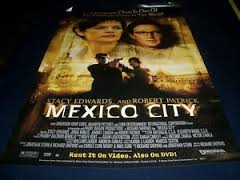
MEXICO CITY
US, 2000, 90 minutes, Colour.
Stacy Edwards, Jorge Robles, Johnny Zander, Robert Patrick.
Directed by Richard Shepard.
Mexico City was directed by Richard Shepard who made such films as Oxygen, The Matador, The Hunting Party and a great deal of television.
The film was shot in Mexico City with vista sequences, details of the city, wealthy hotels, tourist attractions, the seedier part of the city, as well as the American Embassy.
The plot concerns a brother and sister on holidays, the sister having lost her children in a devastating car accident. She says she is not ready for the holiday and lets her brother, a photographer, go out on the town. When he does not return, she is very demanding at the hotel and goes to the embassy, drawing on her American citizenship to make demands.
A friendly taxi driver assists her and they search for the brother in various bars, ultimately finding someone who indicates the truth. It seems that he was involved in taking photographs of violent action – and there has been indication of political unrest before an election in Mexico, the film showing an early abduction of a doctor for ransom.
Ultimately, the taxi driver and the sister drive to the American border where they are held up by a Mexican policeman looking for the photos and the sister shoots him.
As she approaches the border, both sides have guns drawn, she with hands up, finally getting across the border with the Mexicans not shooting and the truth is revealed.
1. The title, the focus on the Mexico City, the visuals, the overviews, the streets, mansions, hotels, dingy clubs? The countryside, the desert, the American- Mexican border? The musical score?
2. The plot, information about the political background, the doctor and his wife, his meal, his chauffeur, the set up in the street with the woman with the baby, its being a doll, the truck, the shooting of the chauffeur, the abduction of the doctor, the three months passing, the news of his being killed?
3. Mitch and Sam, on holidays in Mexico, wandering the city, Mitch and her not being able to face the holiday, Sam and his trying to persuade her? The flashbacks to her life, happiness, children, seeing her unfaithful husband, stopping the car, the truck crashing into the car and killing the children? Her grief? Her husband’s callous response? Sam trying to help? A loving brother? Her staying in the hotel, waking, his absence, her going to the desk, demanding in a very American way, the response of the receptionist, the issue of the police? Going to the embassy, getting a hearing, the police chief present, the Vice-
Consul and his praising the police chief, saying that everything would be done? The revelation that Sam did drugs, had a record, that she did drugs, the urgency and non-emergency of the search?
4. Pedro, the taxi driver, friendly, giving advice, Mitch paying him, his appreciation for his family, going on the search, going into the bars with the photo and Pedro warning that the men resented women’s presence? Finally meeting the drunk man, giving him the drink, his giving the information about Sam at the club? Flashbacks?
5. Trying to find out more, Sam and his photography, the irony that he had photographed dangerous and violent action? His death?
6. The attempt to get the photos, incriminating? Pedro and Mitch driving to the border, Pedro telling his story, the police officer and his wanting the photos, Mitch shooting him? Leaving Pedro at the border, going back to her family?
7. Mitch walking to the border, hands in the air, the Americans confronting the Mexicans?
8. The photos, the impact, arrests?
9. Mitch, playing with Sam’s son, the photos?
Published in Movie Reviews
Published in
Movie Reviews
Tagged under
Saturday, 18 September 2021 19:52
Getaway/ 2013
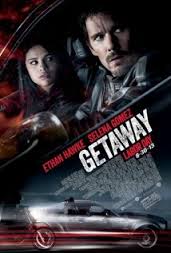
GETAWAY
US, 2013, 90 minutes, Colour.
Ethan Hawke, Selena Gomez, John Voight, Rebecca Budig, Paul Freeman, Bruce Payne.
Directed by Courtney Solomon.
There must be easier ways of robbing a bank!
This is a hyper-adrenaline-charged film, lots of action, lots and lots and lots of high-speed driving through the city of Sofia (with the main characters American). The plot seems basically absurd for most of the film though there is some explanation for motivations at the end.
Ethan Hawke portrays a former racing car driver who has fallen on bad times, needing money and taking on odd jobs. At the opening, we see his wife attacked and abducted. He then is commanded by a mysterious voice (audiences seeing only his glasses nose and mouth whenever he appears) to take a car which has been set up with various cameras connected to the mysterious man’s computers.
For the first 30 minutes or so, the driver is commanded to speed through the city, the voice giving him the various turns, which brings him into conflict with many police cars (all of them demolished) and risky driving through crowded city streets, through a market, and commanded to crash into stalls. We don’t actually see whether anyone is killed or not.
Then the driver is held up at gunpoint by a young girl, Selena Gomez, whose car he has stolen. It has been a gift for her graduation by her banker father. She is cantankerous, she is afraid, she abuses the driver, threatening to get out – but the mysterious voice begins to control her as well.
The driver is desperate to obey the voice so that his wife will not be killed, his glimpsing her at various times during the drive.
Neither the driver, the girl nor the audience have any idea why the voice is commanding the driver to act in this way.
Eventually, it is made clear that he is being set up to rob a bank, the bank of the girl’s father. With so many police in pursuit, it also becomes clear to the driver that they are being set up and other people are robbing the bank at the same time. Which means then that he drives to the bank, now always helped by the girl who is something of a computer whiz. She knows where the power plant for the city is located, goes there only to find that again, she is being set up, and the whole plant explodes.
This time, the girl sets up fake images for the voice to look at and the couple hurry to the bank, driving in regardless of obstacles, actually taking the material the setup which the voice wants to steal, a memory stick filled with information for unaccounted for finances.
This means a set-up for the exchange of the stick for the wife, which duly happens, except that the driver notices and earpiece in the ear of the man he is handing over the material to. Which means that there is the mysterious voice who has not yet been seen. Because the girl has set up the images and fed them to the police, the police raced into the site and the man and his wife are reunited. But the girl is taken, and the driver goes in pursuit and saves her.
We finally see the face of the voice – it is John Voight. And his motivation is that the mysterious man has always admired the driver as a racer but thought that he had not achieved his potential and therefore has set up this particular scenario of fast and seemingly reckless driving to make him have faith in himself!
One might suggest that this is a film mainly for petrolheads!
Published in Movie Reviews
Published in
Movie Reviews
Tagged under
Saturday, 18 September 2021 19:52
Susan Slept Here
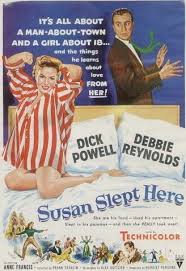
SUSAN SLEPT HERE
US, 1954, 98 minutes, Colour.
Dick Powell, Debbie Reynolds, Anne Frances, Glenda Farrell, Alvy Moore, Horace Mc Mahon, Herb Vigran, Les Tremayne, Mara Lane, Rita Johnson, Maidie Norman.
Directed by Frank Tashlin.
Susan Slept Here is the slightest of comedies yet popular in its time – despite the fact that the Catholic Legion of Decency gave it a condemned rating allegedly for the suggestiveness of its title (others pointing out that they had no difficulty with a male, George Washington Slept Here).
Dick Powell plays a writer who was won an Oscar (the Oscar itself introducing the film and doing some of the commentary, especially about what happens to it in the author’s apartment). He is looking for a new subject and some police friends bring a young woman, a teenager, who has run away from home, to stay with him for a few days so that he can study her. She is played by a vivacious Debbie Reynolds.
When the author’s fiancee (he is described as 35, although Powell was 50 at the time of the film’s release), Anne Francis, somewhat dour and full of herself, phones and Susan answers the phone, we know that there is going to be trouble.
Susan becomes infatuated with the author, almost taking over the house, interacting with the maid and the author’s rather sardonic elderly friend, played by 30s star, Glenda Farrell.
From then on, there is a fair amount of ambiguity and suggestiveness, Susan falling in love with the author, he trying to keep her out of trouble, some farcical incidents in the house, some fantasy sequences – and he goes off to write a script after marrying her to keep her out of trouble.
If you can believe it, there is a happy ever after ending with the author and Susan.
The film was directed by Frank Tashlin, a cartoonist, who was to make quite a number of light comedies as well as a number of Jerry Lewis films.
1. A comedy, with suggestive to
nes, for 1954? In retrospect?
2. The issues of an older man, an underage girl, relationships, sexuality, marriage?
3. Colour photography, the light style and work of the director, a cartoonist, his later career?
4. The Oscar opening the film, comments, its place on the mantelpiece, feeling neglected?
5. Dick Powell as the author, his years in Hollywood, scriptwriter, the writing block? Allegedly 35, having a fiancee? His household, the maid, Maude and her influence? His discussions with the police, landing Susan, having her for several days, allegedly for research? The interactions, Susan as a live wire, in danger of compromising him? The issue of marriage, his going through it to protect her, wanting an annulment eventually? His relationship with Isabelle, her not being very happy with Susan’s presence?
6. The author, going off, leaving Susan, the attraction, his return, Susan and her growing up, her behaviour, manner, situations? Out on the town? Try to behave in a sophisticated manner?
7. The minor characters and their contribution, comic touches, the buddy from the war, sharing the war experience with the author, helping him with his career, eventually going to Washington to the Navy? Maude and her sardonic presence, criticisms, with Susan? The maid, her role in the household? The two police, the repartee, lending Susan to the author for a couple of days? The lawyer and his seriousness? His shrink? The neighbour?
8. Isabelle, haughty, glamorous, suspicious of Susan, their encounters, the discussions with the author?
9. The comic repartee? Of the period? The comic situations, – cartoon style?
Published in Movie Reviews
Published in
Movie Reviews
Tagged under
Saturday, 18 September 2021 19:52
Death of the Self
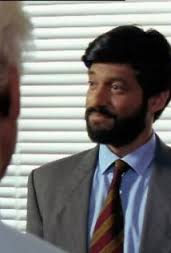
DEATH OF THE SELF
UK, 1992, 100 minutes, Colour.
John Thaw, Kevin Whately, Michael Kitchen, Frances Barber, Jane Wenham, Peter Blythe, James Grout, Georges Corraface.
Directed by Colin Gregg.
Death of the Self has minimal action in Oxford itself. rather, it opens with a ritual in the Italian countryside near Vicenza, with a self-proclaimed guru, played by Michael Kitchen, best known for Foyle’s War, urging people to death of the self by burning something from their past. After the ritual, a prominent novelist is found dead, some suspecting murder, others thinking it an accident, including the Italian police led by Georges Corraface, who appeared as Christopher Columbus in the 1992 film with Marlon Brando as Cardinal Torquemada, but Morse is rather relentless in his investigations.
Morse enjoys being in Italy, the beauty, the culture, the music. Lewis is much less at home, begrudging the time, phoning his wife. Frances Barber appears as an operator singer who has lost her career because of stage fright. There is a gallery of characters who could have committed the murder – only it wasn’t, and the crime to be investigated was artistic fraud.
1. Morse and Lewis in Italy? Work? Morse and sightseeing? Lewis not so sightseeing oriented? The beauty of Italy, the city of the chance, the fillers, hotels, police precincts? The scenes in Verona, the city, the amphitheatre?
2. The musical score, classic, opera? Morse and his love for music, tears?
3. The title, the ritual of burning the past? Freedom? A good effect or, as Nicole, said, bullshit?
4. Russell Clark, the leader, assisted by Maureen? The self-proclaimed guru? his performance in conducting the ritual? His record, Morse putting him in jail? His going to Italy, his wealthy clients, the brochure?
5. The irony of the murder? Its being considered in the accident? And the fact that it was? The novelist, her husband and his bookshop, the insult to Baines and his wife? Her reputation as a novelist?
6. Morse, his antipathy towards Clark, relentless? The scenes in Oxford, the court, the threats? The transition to Italy, Morse and his love of Italy, eager to go, Lewis, begrudging the time, not oriented toward sightseeing, his phoning home, his wife giving a clue, back home for his son’s sports day?
7. The Italian police, Battisti as the officer, type, the enquiry, his conviction that it was an accident, the evidence of material that was not completely burnt, the writing, the shawl? Discrepancies of numbers? Deliberate, clerical error? His thinking Morse single-minded? His personality, upset with Morse, continually smoking? His following the author’s husband? Not telling Morse? The link with the library and the parchments?
8. Morse and his interrogations, the husband of the deceased, his bookshop, his interests, suspicious? The professor, his wife having had a stroke, each suspecting the other of having killed the author? The American woman and her loudness? Persuading Lewis to come to the social, drinking and dancing? The missing man, his false name, the affair with the novelist, appearing in Verona, being chased in the street, his false name, his alibi?
9. Nicole, her nerves, her singing career, the story, Verona, marrying Guido, her enjoying talking with Morse, the tour of the grounds, finding the money in the refrigerator? The rehearsals, the night before the performance and her staying in Verona? Not being linked with Guido and his suspicious behaviour? Her singing and the acclaim at the end for her concert?
10. Battisti, his investigations, the arguments with Morse? The final collaboration, the gathering and the arrests, the interrogations?
11. Russell Clark, his attitudes, taunting Morse, seen Morse with Maureen? Maureen and her saying she would turn over a new leaf? The irony of the finale, Clark and his taunts, Morse realising the document was at the back of the mirror, Maureen’s influence? The bookshop owner and his contributing to the
fraud? (The explanations given by the librarian during Morse’s visit?) Guido and his forgery? Morse, the examination, hit on the head – by Maureen?
12. Clark, his visit to Mrs Baines, her delicate state of health, intimidating her, her death?
13. The blend of mystery, sightseeing in Italy, Morse and Lewis in a different context?
Published in Movie Reviews
Published in
Movie Reviews
Tagged under
Saturday, 18 September 2021 19:52
Land of the Bears
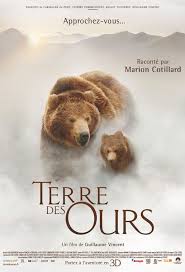
LAND OF THE BEARS
France, 2013, 86 minutes, Colour.
Narrated by David Gasman.
Directed by Guillaume Vincent.
It is a 99.9% safe bet to say that most people have never and will never visit the Land of the Bears. And where is this land? Almost immediately, this interesting documentary tells us that it is in the eastern part of Siberia, the Kamchatka peninsula. Since most of us are not going to Siberia let alone this peninsula, watching The Land of the Bears is the next best thing.
This is a French documentary, unobtrusively filmed, the bears not looking at the camera at all (though there are some tracking shots where the crew must be in a boat gliding along photographing the bears) but a style of photography that captures the realities without drawing attention to itself.
We are introduced into a wintry landscape, snow melting on rocks, and the viewfinder opening up to a mountainous region, snow and ice-clad, a territory that looks isolated and undisturbed, that no human beings have ventured there. But there is life. We are told that there are 20,000 Bears, and as spring progresses, there is quite a deal of birdlife. At some moments, in the sea at the shore, there is some sea lions looking for fish to eat. And the fish available are salmon, swimming upstream so that they will spawn millions of more salmon, ready for the bears to capture them and devour them so that they will have full bellies and be able to go into their dens and sleep for eight months, hunger satisfied. This is a cycle of life, quite a vast and particular eco-system.
So, in we go to a den, and are introduced to a mother and her cubs, and learn that bears live solitary lives in general, and that after some seasons, the mother lets go of the cubs as they become adult bears and fend for themselves. At this stage, however, the mother cares for her cubs, finding them salmon, protecting them in times of danger. There are some moments of danger, the male bears being huge and dominant, territorial concerning the salmon that they are hunting.
Which means that the film covers the four spring and almost-summer seasons, where the bears come out and roam, spending most of their life in the water, waiting for the salmon to come, catching the salmon as they arrive, eating the salmon, (with some close-ups of how they eat, tearing skin, cutting into the flesh, and between those teeth and into the mouth).
In some ways, the film and its story is rather repetitive but there is a fascination at this opportunity of looking at the bears (longer snouts and faces than the bBears we are used to from the Americas – although the final credits indicate that a lot of the base equipment for this film was set up in Alaska, comparatively close by.
In the French version, Oscar-winner Marion Cottillard is the narrator. For the English language version, the narrator is David Gasman, who has a quietly low key and easy-to-listen-two voice, certainly not intrusive in any way, leading us more gently into the narrative and the life of the Bears. While there are some moments of feeling, especially about the young bears, some of them excluded by other cubs, possessive of their fish, and with the young male cub alerted to the female cub and gradually becoming aware of the mating instinct. But there is no sentimentality at all, with the functions of eating, swimming and surviving. There is a kind of anthropomorphic perspective, but it is not indulged in any way to make the cubs and their behaviour seem cute.
Land of the Bears was filmed in 3D and best to experience it that way. While it would look good in 2D, especially on the big screen, it would also look good in 2D on a television screen.
Devotees of nature films and films showing details of the lives of animals will not want to miss this one.
Published in Movie Reviews
Published in
Movie Reviews
Tagged under
Saturday, 18 September 2021 19:52
Mixed Nuts
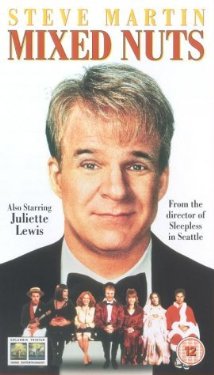
MIXED NUTS
US, 1994, 97 minutes, Colour.
Steve Martin, Madeline Kahn, Robert Klein, Anthony La Paglia, Juliette Lewis, Rob Reiner, Adam Sandler, Liev Schreiber, Rita Wilson, Parker Posey, Jon Stewart, Joely Fisher.
Directed by Nora Ephron.
Mixed Nuts is based on a French film, Le pere noel est un ordure (1982). It has been adapted for the zaniness of life in California.
The setting is Christmas Eve, Santa Claus on the streets, the time of gifts – but activity in a Lifeline type of agency where there are many and strange clients, where the landlord wants to close the agency, where there are tensions in relationships. There are also several subplots involving an eccentric range of characters.
The film was written and directed by Nora Ephron, best known for such films as Sleepless in Seattle, Heartburn, You’ve Got Mail.
The film has a very strong and eclectic cast, led by Steve Martin as the manager of the agency, with Madeline Kahn as his very superior associate. Rita Wilson is the young woman in the agency, infatuated with the director but who is also the subject of infatuation by Adam Sandler in an early role.
Gary Shandling is the mean owner of the building. Live Schreiber is a client who loves cross dressing. Robert Klein has a passion for dogs, and for Mrs Munchnik. A subplot involves a pregnant Juliette Lewis angry with but pursuing the father of her child, Anthony La Paglia, as a would-be artist. Rob Reiner is a doctor. And we see Jon Stewart and Parker Posey as a rollerblading couple.
Reviews for this film were very mixed, some seeing it as an excellent black comedy, others seeing it as silly and bizarre.
1. 1990s comedy? Black comedy? The strong cast, the career of the director? Based on a French film, adaptation to California?
2. The Christmas setting, the city, the work at Lifeline, the range of characters, interconnections, crises? Comedy and farce?
3. The cast, their screen presence, different comedy styles? A group of mixed nuts?
4. The agency, their work, the phone calls and clients, desperation? Philip and his control? Clashes with the landlord, money? Mrs Munchnik and her style, superior to the others? Catherine, pleasant, in love with Philip? Trying to hold the agency together?
5. The subplot of Gracie and Felix, his carelessness, wanting to paint the mural, his Santa Claus episode, the farcical aspects? Gracie, at home, pregnant, love for Felix, yet pursuing and attacking him? Her friendship with Catherine, going to stay with her, getting advice?
6. Mr Lobel, his concern, animals, cats, relationship with Mrs Munchnik?
7. Financial issues, the landlord and his wanting to close the agency, the banks, the various schemes to keep the agency open? Philip and his anxiety?
8. Catherine, the work in the office, relationships, friendly with Gracie?
9. Stanley, the landlord, his harsh attitudes, wanting to oust Philip?
10. Christmas Eve, Mrs Munchnik, going to the elevator, getting caught, the device for getting out?
11. Louis, his songs, love for Catherine?
12. Chris as a client, his love for long dresses, dancing, therapy?
13. The rollerblading couple, the relationship, their place in the film?
14. The ingredients for farce in black comedy? Mixed reception for the film at its time? Later?
Published in Movie Reviews
Published in
Movie Reviews
Tagged under
Saturday, 18 September 2021 19:52
Ramen Girl, The
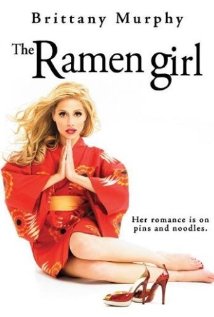
THE RAMEN GIRL
US, 2008, 102 MINUTES, Colour.
Brittany Murphy, Sohee Park. Kimiko Yo, Tashiyuki Nishida, Daniel Evans, Gabriel man, Tammy Blanchard.
Directed by Robert Alan Ackermann.
The Ramen girl is Abbey, a young American who has gone to Tokyo to be with her boyfriend – but he has gone off and left her. Alone and lonely in the city, she gets a menial job in an office, but craves something more.
She goes into a local restaurant and experiences Ramen soup. She gets the idea that she would like to make it, but the local chef is very superior, especially to wealthy and young American girls. He gives her all the dirty jobs in the restaurant but she perseveres, eventually breaking him down and his allowing her to cook, but strongly criticising the results. Needless to say, she perseveres and eventually does well with the soup, getting the grudging approval of the chef, the friendship of his wife, and support for them concerning their son who is in Paris and is not following the family tradition.
She returns to the United States and sets up her own restaurant.
1. A Japanese- American story? An American girl discovering a new culture?
2. The Japanese settings, the city, apartments, the restaurant, the kitchen, the atmosphere of the Ramen restaurant? Musical score – from both cultures?
3. The character of Abby? Her age, background, American, wealth, family? Coming to meet her boyfriend? His leaving? Alone, lonely? Her job in the office, the personnel, unsatisfying?
4. Her going to the restaurant, experiencing the soup, the effect on her?
5. Coming back, discussions with the master chef, with his wife? His haughty attitudes and looking down on Abby? The wife more sympathetic and
helpful? Their story, their son in France, his not following in his father’s footsteps? The disappointment?
6. Abby and her request, the chef unsympathetic, giving her menial jobs? Her doing them? The desire to be there, to be able to make the soup? Her perseverance?
7. The chef, finally allowing her to work in the kitchen, his adverse comments on the blandness of her soup? Her persevering with the ingredients, the cooking? The chef never satisfied?
8. Her eventually succeeding, his giving some approval, the personal relationship between Abby and the husband and wife?
9. A sense of achievement, her experience of a different culture, becoming part of it with her understanding, cooking?
10. Return to the United States, setting up a restaurant, the photo of the chef and his family?
11. A pleasing look at the encounter between Japanese and American culture via cooking and the Ramen soup?
Published in Movie Reviews
Published in
Movie Reviews
Tagged under
Saturday, 18 September 2021 19:52
Wish I Was Here
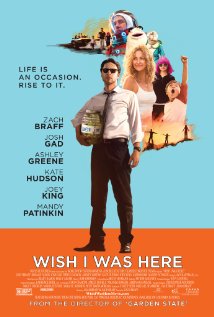
WISH I WAS HERE
US, 2014, 106 minutes, Colour.
Zach Braff, Kate Hudson, Mandy Patinkin, Josh Gad, Pierce Gagnon, Joey King, Alexander Chaplin, Jim Parsons, Allan Rich.
Directed by Zach Braff.
One of the main reasons for seeing Wish I Was Here is Zach Braff. He not only co-directed and wrote, he also stars. And the important factor for the film ever being made was that Zach Braff and his co-producers advertised online, on Kickstarter, the site for ordinary people to donate for the production of a film. There is a huge list at the end of people thanked for their contributions.
The title sounds a little fey. And this is reinforced at the opening with a bizarre picture of Aidan, the central character, in a kind of science-fiction scene. And then he wakes up. But, during the film, he has some of these recurring images, especially concerning his brother and his father.
Aidan is an aspiring actor in Hollywood, landing mainly commercials and supporting roles. He is happily married to a very nice wife, Sarah, Kate Hudson being charming. He has two very energetic children, the older is a girl (Joey King), with the symbolic name of Grace which is important at moments during the film. The younger child is a lively son, Tucker (Pierce Gagnon). The first family scene is at the breakfast table which, somewhat disconcertingly, has a fair amount of swearing – with the family having a swear jar on the fridge and dad having to contribute a great deal. Then it lightens up as Aidan goes to sit with a crowd waiting for an audition – where the role has been changed, without his knowing, to an African- American role (with all the aspirants in the waiting room noting how they had all played Othello).
Almost immediately, a very strong Jewish theme is introduced. It is interesting to note that Zach Braff’s father is Jewish and his very New England traditional mother converted to Judaism. Aidan drops his children at a Jewish school which they thoroughly enjoy, Grace being particularly religious, knowing the scriptural background, interested in God issues, a girl who prays. The trouble is that they might have to move out of the school because their grandfather, Gabe (Mandy Patinkin at his best) has recurring cancer and needs the money with which he paid their fees for his treatment.
A lot of the film is consists of moments which are anecdotes, the decision to mend the fence and clean the swimming pool after his father’s criticisms, several conversation sequences, a visit to Aidan’s brother, Noah (Josh Gadd) who lives in a trailer where the door is rarely opened, working on a blog, some fine moments where Aidan is home-schooling his children because they cannot afford to go to the Jewish school.
The film is strongly pro-family, Aidan’s wife conscious that he is not always present when he is actually there, tries to find ways to bring him back. Both parents are devoted to their children. There are many fine, sometimes amusing, sequences showing family life.
Another very strong theme is that of dying. Aidan, close to his father, while Noah cannot bring himself to see his father, arranges a room in the house so that his dying father can have his final days at home. Mandy Patinkin’s performance shows a lot of the reality of fearless dying, including a beautifully intense conversation with Sarah, her gratitude to him for helping her through her sister’s death, talking with Aidan about the past, Gabe saying that he was not afraid and Aidan finding this most reassuring. Aidan phones Noah to come for his father’s death, Noah resisting but Grace going on the phone and very movingly persuading him to come. Which means that the death scene is quietly powerful.
Mention has been made of Judaism. There are various visits to Temple, to the school, to the ceremony for Gabe’s funeral. Aidan, who feels that he is not particularly religious, still focuses on questions of God and prayer, coming to talk to the rabbi in the Temple, the rabbi giving sound advice by asking Aidan how he might imagine God, with Aidan replying, using the word infinity to indicate his feel for the wonder of the universe. The rabbi urges him to reflect on how that works in his life. Aidan is really resistant to the phrase, God works in mysterious ways. And yet, a lot of the resolution of the film indicates mysterious ways, what other people might call Providence.
There is a nice ending, involving another audition and meeting with a man who was at a previous audition, Paul (Jim Parsons) and Aidan gives him good advice about his supporting role in a Star Trek kind of film. This is so much appreciated by Paul that he offers Aidan at some possibilities in theatre education that he never dreamed of.
Just before the final credits there is a collage of the events of the film and the central characters are all together a theatre performance.
Wish I Was Here illustrates that the humanity in the earlier film that he directed, Garden State (2004) is now even more evident.
1. The title? Aidan and his life? Being present, not present, living in his imagination, the reasons?
2. Los Angeles and the suburbs, the home, the yard and the pool, offices, audition rooms, home palliative care, supermarkets? The musical score? The Jewish overtones?
3. The picture of a family, mother, father, son, daughter? The opening and the table, the language, the swear jar and the reactions? Aidan there or not? Sarah as a good and kind person? Grace and the meaning of her name, interest in God, reliance on God and prayer? Tucker as a young boy?
4. Aidan, the credits, the science-fiction heroes of his childhood, in his imagination, the action, recurring? His relationship with Noah, with his father? Seeing them in the imaginations? The auditions, the irony of the search for an Afro- American actor? Paul, the auditions? The science fiction, Aidan’s knowledge of Stark Trek, his advice and prediction as to what was to happen to the character?
5. The Jewish school, Aidan delivering his children, the discussions with the rabbi, about the payments, Aidan not believing in God, going to the back to the rabbi and talking with him, the rabbi’s wisdom in asking what kind of God he might imagine, Aidan and the God of creation of the universe, infinity? The rabbi encouraging him to develop this? The children liking the school, not wanting to leave? The decision for home education? The Temple sequences, the crowds, the interview with the rabbi, his father’s funeral? The religious language? The importance of the Hebrew word for charity, approaching the rabbi about the fees, and his saying he could take from others for the Bloom family? The pervasive Judaism of the film?
6. The language of spirituality, God language, belief or not? Sarah not saying anything about faith? The children, Grace and her religious perspectives? Aidan and his reflecting on spirituality, the meaning of the universe? Not liking God and mysterious ways? Yet the opportunities for change, a kind of providence?
7. Sarah, at work, the crass sexual harassment and Gerry, her reaction, telling Aidan and telling him not to be upset? Gerry at the supermarket, propositioning the girl, confronted by Aidan and the children, Gerry punching him? The end, the interview, his accusations of sexual harassment, having to do the course, paid for by the Blooms, many times, fired?
8. The portrait of Aidan’s father, his coming to the house, criticism of the broken fence and the untended pool? The issue of money for the school, his paying the fees? The truth about his dying, the cancer, the treatment? Using his money for his health? His past, micro-biologist, at the University? Telling Sarah that he had been let go because of not keeping up with new technology? Her urging him to tell his sons? Aidan and his holding the family together, Noah and hurt, the memories of his father?
9. Noah, his trailer, the smell, keeping himself in, eccentric and nerdish, the blog, his interest in science-fiction, the girl and her confrontation with him? The Com Con conference, his costume, the parade, his winning the competition, the sexual encounter with the girl? Aidan’s phone call urging him to come to their dying father, Grace and her persuasive talk on the phone, her request? His turning up, the effect?
10. Sarah, the significance of the scene where she talked quietly with Gabe, the memories, his support when her sister died, his wise words, his saying she would be a good matriarch – and she saying that she already was?
11. Gabe, talking to Aidan, communicating, dying, the medicos outside, the almond ice cream, his declaration that he was not afraid, reassuring Aidan with this? The two boys, his final words? Aidan in the sea? The two brothers and their speech at the Temple?
12. Aidan becoming a true father, true husband, the sexual moment with his father catching him, doing the work in the laundry, Sarah’s approach, singing, the afternoon in bed, Sarah telling him about Gerry?
13. Fixing the fence and the pool, Gabe’s criticism, the kids willingly helping, their hard work, Grace on the diving board and reciting Robert Frost’s poem, Mending Wall, Aidan urging her to say it as a prayer that was not being heard?
14. Aidan fathering, the adventures with the kids, the photo of his father with the car and not having it, going to the showroom, his spiel about Puff Diddy and his children, Anthony and his seeing through the spiel, thinking that Grace was ill because of her shaven head? The exhilaration of the ride?
15. The home of the rich family, their being away, going to the pool, getting Grace to trust him and jump into the pool?
16. The end, providence, meeting Paul, the audition and his getting the part, Paul inviting him to the drama school to teach?
17. The scenes of Aidan teaching, the students listening to him, the performances? Grace at high school with the boy, shaving her head, the coloured wigs? Tucker and his dressing up? Noah and his girlfriend at the performance, Aidan and Sarah, the children? Happiness…?
Published in Movie Reviews
Published in
Movie Reviews
Tagged under
Saturday, 18 September 2021 19:52
Invisible Circus
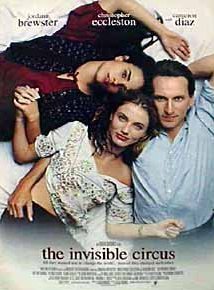
THE INVISIBLE CIRCUS
US, 2001, 93 minutes, Colour.
Cameron Diaz, Jordana Brewster, Christopher Eccleston, Blythe Danner, Camilla Belle, Patrick Bergin, Isabel Pasco, Moritz Bleibtreu..
Directed by Adam Brooks.
An oddity.
In the 70s an 18 year old girl (Jordana Brewster) retraces her dead sister's steps in Europe. The sister (Cameron Diaz) had left home with her boyfriend (Christopher Eccleston) in the late 60s, a mixture of hippy and social rebel. In retracing her journey (and trying to share her sister's experiences with drugs, with her boyfriend), she learns of her sister's involvement with underground terrorist groups and her ultimate suicide.
In recreating the 70s, the film shows us a very idiosyncratic period that looks now more than a little absurd. By not distancing the action from a contemporary perspective, it seems as if we are sometimes watching a film of the time, so that the absurd touches make the film somewhat dated and absurd.
1. The story of the 1970s, in retrospect? The ethos of the time? In the United States? Europe? Revolutionary movements?
2. The title, its reference?
3. The picture of the United States, its lifestyle at the time, the family, the house, the beach? The musical score?
4. The contrast with Europe? Paris and its style? France and the countryside? Berlin? Portugal and the coast, the beauty?
5. Two sisters, the bonds between them, memories of their father, his death from leukaemia, the relationship with their mother? The father gone, idealising him? The bond with their mother? The flashbacks to sequences of the young girls and their life, with their parents?
6. Phoebe, her age, a romantic image of Faith, memories of the bond between the two, the postcards from Faith and their stopping? The news of her suicide? Phoebe and her puzzled attitude, discussions with her mother? Imagination and freedom? To retrace her sister’s steps? The mother trying to persuade her not to go?
7. The portrait of Faith, young, exuberant, at home, in love with Wolf, leaving? Life in Europe, the freedoms, love, the drugs? Berlin, the interest in the Red Army, involvement, the tests, the terrorist activities, her failing? The reaction of the group? Difficulties with Wolf? Travelling to Portugal? Her death and the reasons?
8. Phoebe, arriving in Paris, meeting Wolf, the time differences, his look and appearance? Meeting Claire? Phoebe’s hesitance, asking about Faith, learning? With Wolf, the attraction, the drive to Portugal? Wolf’s story, Phoebe believing it or not?
9. Wolf’s explanation of Faith’s death, the flashback?
10. The picture of the 70s revolutionary groups, the types, lifestyle, behaviour, terrorism, the Red Army in Berlin?
11. The purpose of Phoebe’s journey, settling the memory of her sister, the importance of the journey for herself?
Published in Movie Reviews
Published in
Movie Reviews
Tagged under